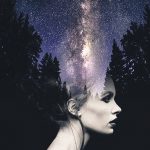The Creative Mind & Addiction
Are Addiction &
Creativity Linked?
Artists have historically carved out a certain reputation as wild, eccentric, nonconformist, and keen on mind altering substances. Countless artists have been known to tamper with mind-altering substances, many still have fallen into addiction. On the flip side of things, it seems that many who suffer from addiction are also creative types.
There’s of course the 27 club—musicians who all died from substance abuse at the young age of 27. There are painters and poets, novelists and musicians; there are artists of every genre who are drawn to alcohol and drugs. Why?
Is there some connection or link between creativity and addiction?
It turns out that there is no direct correlation between addiction and creativity. Thankfully, every artist is not destined for a life of addiction—of course not. There are, however, a few reasons why there is so much overlap between artists and addicts.
There are a handful of personality traits often ascribed to people with addictions that happen to be necessary for creativity as well.
Brain Chemistry of
Addiction & Creativity
For one thing, from brain-imaging studies, it has been discovered that many people with addiction have low-functioning dopamine systems. This means activities that cause pleasure give them less pleasure than most people experience— lower amounts of dopamine are produced in their brains.
Imagine if the things that make most brains go “weeeee!!!” make these people’s brains just go “oh, cool.” These are things like sex, learning, exercise, and fatty foods. Of course, alcohol and drugs make the brain produce way more happy chemicals than most everyday activities do. So these people are more prone to addiction.
They are likely to put in more effort than most to achieve those happy feels, because pleasure is historically harder to come by for them. Because of this, individuals with variants of low-functioning dopamine systems are often also risk-takers, impulsive, and novelty-seeking. These traits happen to also be requirements for creativity.
Personality Traits Associated with Addiction & Creativity
There are a handful of personality traits that overlap in creative individuals and people with addiction.
Impulsive—They are more likely to act on an urge or desire over other reasons. This renders a more intuitive and feeling approach to things. Impulsivity lends a person to improvisation and acting without inhibitions.
Risk Takers—Impulsivity easily leads to risky behavior. These people are likely to take chances that most wouldn’t wager, and even get a thrill out of taking risks.
Nonconformity—They resist authority, absolutes, and convention. Interested in forging new methods and experiences, they place value on nonconformity and going against the grain.
Stimulation—It isn’t that they are bored easily, but that they desire to be stimulated more often than most. They have a persistent drive to feel engaged, excited, and alive.
It’s easy to see how these traits would allow for creativity, as well as substance abuse and addiction. To break the law regularly for the sake of getting high is a big risk to take. So is going out in front of a huge crowd to play your music, not knowing how they will react, or neglecting professional development for the sake of pursuing artistic endeavors.
Nonconformity might drive someone to create something new and never heard of before. It might also provide disdain or disregard for the law and social conventions, which drinking excessively or using drugs defy. And so on.
Famous Artists with Addictions
There are seemingly endless famous artists who have suffered from addiction. Billie Holiday, a jazz singer who worked with greats like Louis Armstrong, was an alcoholic. So was Bonzo, the game-changing drummer from Led Zepplin. More recently, Macklemore and Lana Del Ray both have suffered from addiction.
Vincent Van Gogh was a total alcoholic, though he also suffered from a mood disorder. The famous abstract expressionists Jackson Pollack and Mark Rothko were both alcoholics as well. The street artist, Jean-Michel Basquiat, died at the familiar age of 27, from a heroin overdose.
The French poets Arthur Rimbaud and his controversial lover, Paul Verlaine, were known to abuse absinthe and opium regularly. Charles Dickens also was an opium fan. Ernest Hemingway changed modern novel writing and also was a known alcoholic.
The list goes on and on.
Creativity Can Exist
Without Addiction
Many artists confuse their creative abilities as products of an altered mind through substances. The truth is, though, most artists have been more productive and effective during sober periods than while using. In fact, creative expression can stand to serve some of the desire for pleasure that these people often feel.
In this way, artistic creation may actually offer a coping skill and does not in any way need to be accompanied by substance abuse. If you are struggling with drinking or drug use and don’t know what to do, call (877)670-8451. You can learn how to be happy without drugs and alcohol.





